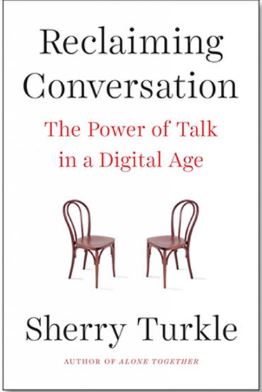A great book is so powerful that you stop reading, lower the book, and simply linger in the words for a moment. You ask God, “What might you be saying to me through this?” Reclaiming Conversation: The Power of Talk in a Digital Age by Sherry Turkle, was one such book for me.

Turkle, a professor at MIT, has been studying people’s relationship with technology for 30 years. In Reclaiming Conversation, she looks at the first generation of children who grew up with smartphones now that they are graduating college and beginning to enter the workforce. She also examines the impact of technology on relationships with our families and friends, dating, teaching and education, and the workplace. My concern, like many of yours, is how this intersects with our work as pastors and leaders in the church.
I do hope that you will read this 362-page work as it expounds on profound challenges before us in the building of disciples and churches. But the following are a few of the more significant points I am pondering:
- There has been a 40% drop in empathy among college students in the last 30 years. They believe this is due to students having less direct face-to-face contact with each other.
- People are turning to phones instead of each other. We are hiding from each other even as we’re constantly connected to each other.
- Studies show that the mere presence of a phone on a table (even a phone turned off) changes what people talk about. Even a silent phone disconnects us.
- On social media, we spend more time performing a “better version” of ourselves with as little vulnerability as possible.
- Research confirms that the 1st generation of children who grew up with smartphones have a hard time with eye contact, beginning and ending conversations, and are lacking in key relational skills.
- Over-reliance on devices is harming our ability to have valuable face-to-face conversations, “the most human thing we do.”
- Many of our children are growing up anxious and awkward because they can’t get their parent’s full attention. They are too distracted.
- We use phones to block sadness, difficult feelings, and awkward moments.
- Technology brings significant complications for our singles and their “romantic” connections.
- 9 out of 10 college students text in class. Two to three minutes is too long for them to pay attention without checking their phones.
- Multitasking gives us a neurochemical high so we think we are doing better and better when actually we are doing worse and worse.
- We lose our ability to summon deep attention and be reflective over time. That takes practice.
- The most powerful learning takes place in relationship. Presence is key. Online platforms have limitations.
I appreciate Turkle’s refusal to name our struggle with screens as an addiction like heroin. Laptops and smartphones are not something to remove. “They are facts of life and part of our creative lives. The goal is to use them with greater intention. We are faced with technologies to which we are extremely vulnerable and we don’t always respect that fact “.
She invites us to experiment with the creation of sacred spaces in our homes (e.g. no devices at dinner, in the kitchen, the car). She recommends technology time-outs to reclaim conversation with our children, friends, and coworkers. I especially appreciate her emphasis on our need to protect alone time for creativity and unitasking (i.e., focusing on one thing at a time).
I thank God for the many gifts digital technology bring to us in the church. At the same time, our phones are not just changing what we do, but who we are – in significant ways. I believe this opens a door of incredible opportunity for us to bring powerful gifts from our rich Christian tradition both to our churches and to the world.
But that is the subject for another time.
–Pete
Twitter @petescazzero







